
Corruption is a serious social , economic and political problem of today’s time. It not only hinders development but also gives rise to inequality , injustice and moral degradation in the society. Corruption means – misuse of rights , position or power by any person for personal gain. It is a cancer that hollows out the roots of the nation.
Types of corruption:
- Political corruption :
When politicians , ministers or high officials misuse power to obtain personal gain , such as by taking bribes , committing scams or buying votes. - Administrative corruption :
Government officials demanding illegal money in return for public work , procrastinating in work or ignoring the rules. - Moral corruption :
When common citizens of the society start using lies , fraud and unfair means instead of honesty. - Educational corruption : Incidents like
rigged admission processes , fake degrees , and cheating in examinations. - Economic corruption :
Black money transactions , tax evasion , financial irregularities in government schemes etc.
Causes of Corruption:
- Loose enforcement of laws
- Lack of education and moral values
- Delays in the justice system
- Lack of political will
- Poverty and unemployment
- Lack of public awareness
Harmful effects of corruption:
- Obstacles to economic development :
Lack of investment and failure of government schemes. - Social inequality :
The gap between the rich and the poor grows deeper. - Lack of trust :
Public’s trust in the government and administration weakens. - Decline in values and morality :
People start considering unfair means as right. - Decline in foreign investment :
No country wants to invest in a corrupt environment.
Measures to prevent corruption:
- Stringent laws and speedy justice
- Use of e-governance
- Public awareness campaign
- Moral education in the education system
- RTI( Right to Information)
- Strengthening institutions like Lokpal and CVC
- Enhance monitoring capacity of media and social media
conclusion:
Eradicating corruption is not only the responsibility of the government , but every citizen has to be vigilant and active against it. Until the society does not adopt honesty , transparency and accountability , it is not possible to end social evils like corruption.
We should collectively take a pledge that we will stay away from corruption and inspire others to fight against it. Only an honest society can lay the foundation of a strong and prosperous nation.
Preface
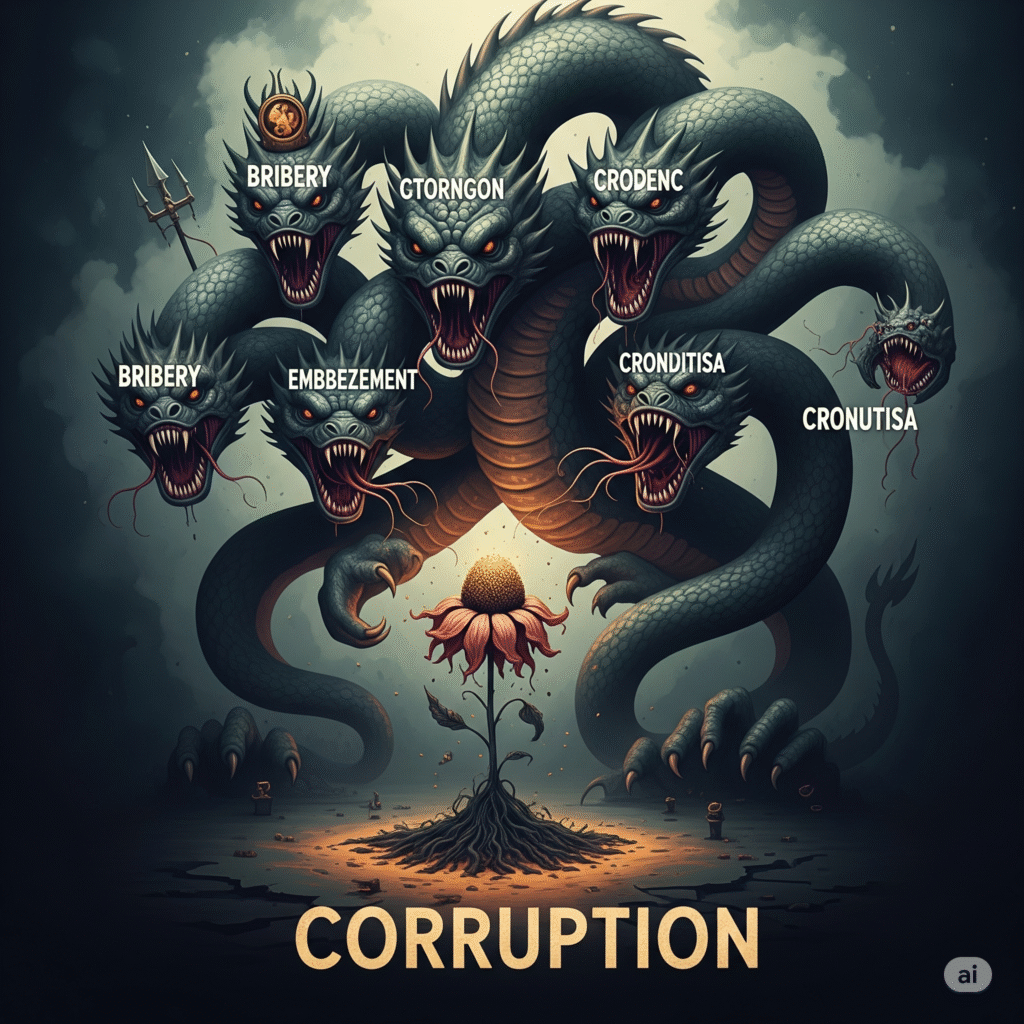
Corruption is one of the most complex and destructive problems of modern society. It is a social evil that weakens the development , governance and moral structure of any nation from within. When a person or an institution misuses its position , authority or power for its personal gain , it is called corruption. This problem is not limited to the government system only , but its roots have spread to every level of the society. Be it education , health , business or justice system – every sector is affected by it in some way or the other. Corruption not only causes economic loss , but it also causes a serious blow to the trust of the general public and democratic values.
Types of corruption
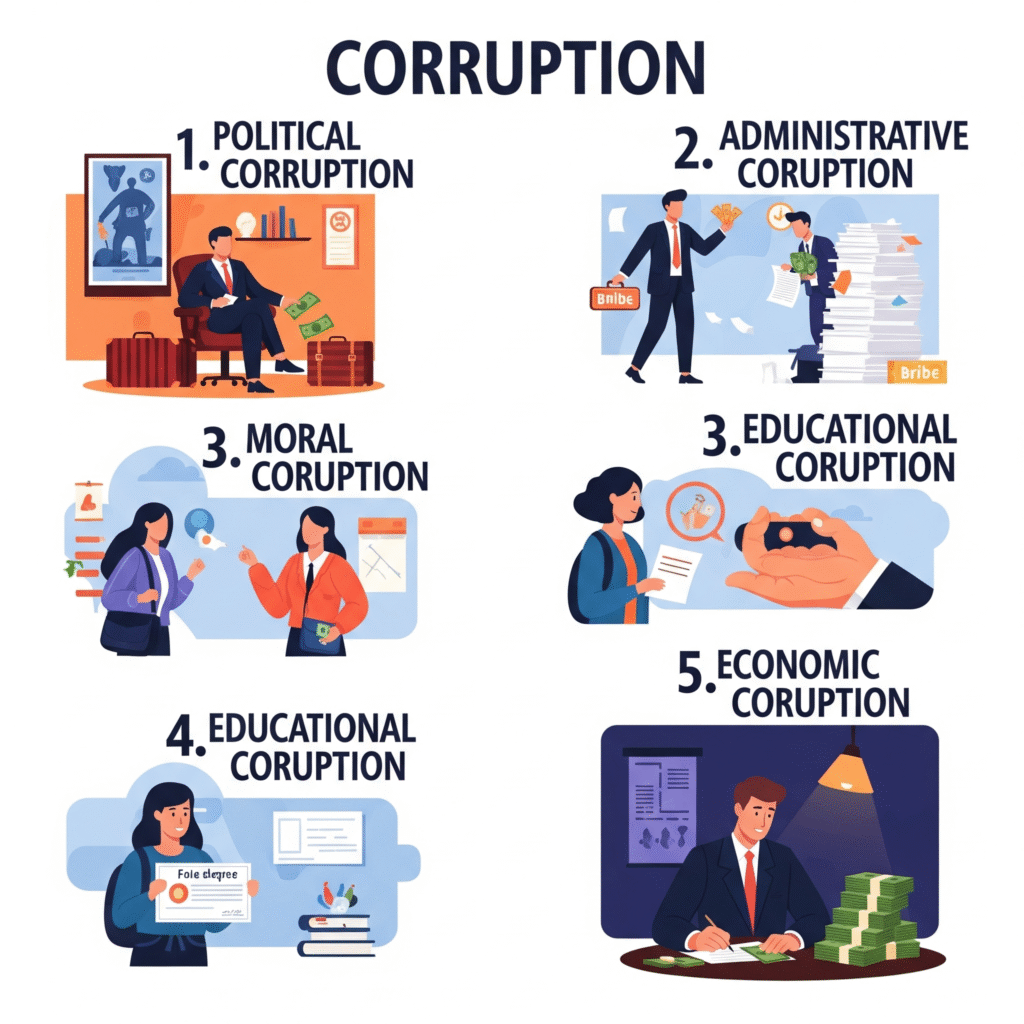
Corruption is prevalent in society and government system in many forms. It can be classified on various basis. The main types are as follows:
- Political corruption :
When public representatives , ministers or political parties misuse power and take decisions in personal or party interest , it is called political corruption. Example: Use of money power in elections , bias in policies , buying votes, etc. - Administrative corruption :
Government officials using their position to take money illegally from the public , cause unnecessary delay in work or give undue benefits. - Economic corruption :
When people or organizations commit tax evasion , accumulation of black money , scams and financial malpractices. It seriously affects the economy of the country. - Educational corruption :
Irregularities in the field of education such as fake degrees , admission in exchange for money , buying and selling of answer sheets, etc. - Judicial corruption :
Taking bribes in the judiciary to bias judgements , unnecessarily delay cases , or prepare weak charge sheets. - Moral or social corruption :
When common citizens themselves adopt wrong methods , like making false documents , giving bribe to avoid fines , then it is a symbol of moral degradation. - Corruption in private sector :
Private companies are also full of cases of bribery , internal scams , favouritism and fraud.
Every type of corruption , no matter how small , weakens the foundation of the entire society.
Causes of Corruption
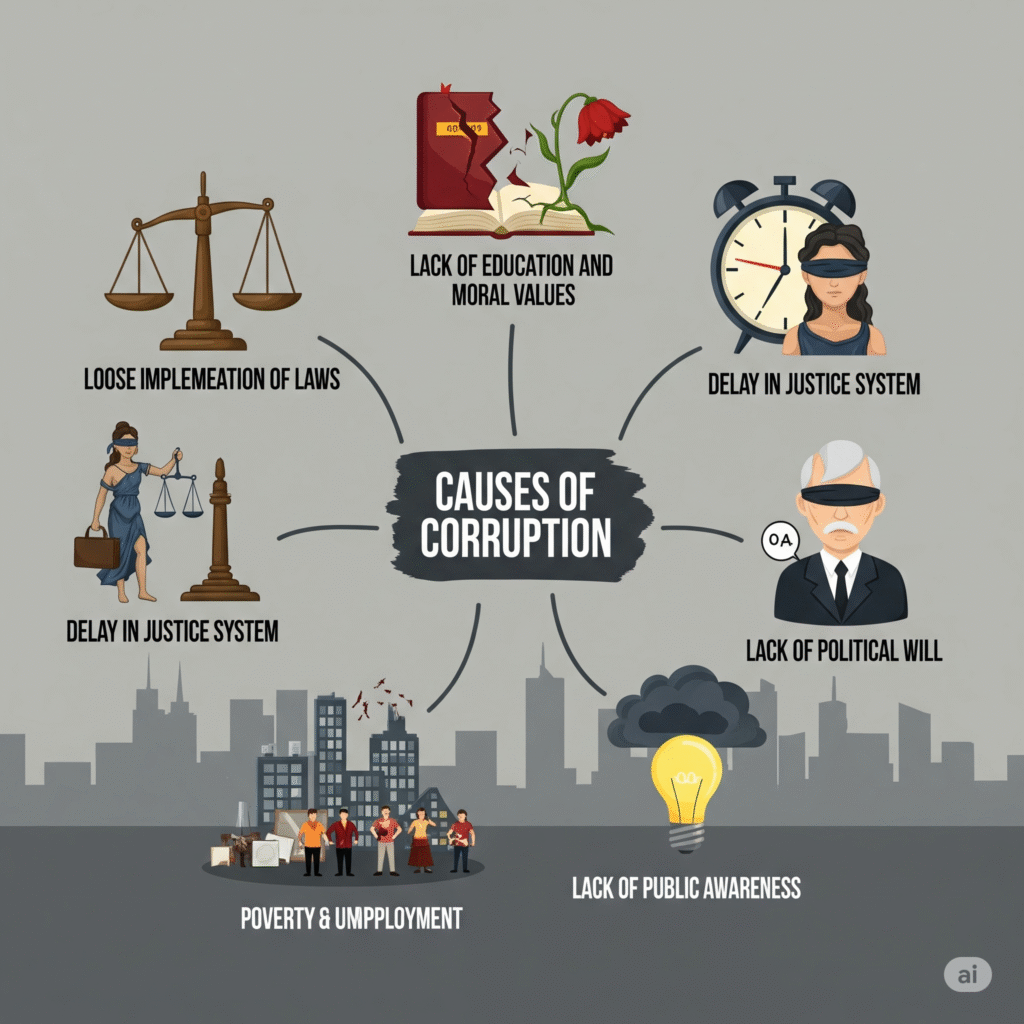
Corruption has deep roots and there are many social , economic , political and administrative reasons behind it. The main reasons are as follows:
- Poor enforcement of laws :
Laws exist in our country , but they are not implemented effectively and promptly . Delay in punishment or lack of punishment for corrupt people makes them more daring . - Lack of political will :
Many times governments avoid taking concrete steps against corruption because their own interests may be affected. When the political leadership itself is involved in corruption , reform becomes impossible. - Delays in the Justice System :
Due to trials getting delayed for years, corrupt people live without fear and the criminal process becomes ineffective. - Lack of education and moral values :
When children are not given proper knowledge of morality , honesty and social responsibility , they grow up and start considering corruption as normal. - Unemployment and poverty :
When people do not have proper sources of income , they are forced to earn money through illegal means. - Corrupt environment and social acceptance :
When corruption is considered normal in the society and people start accepting it instead of stopping it , it increases further. - Administrative complexities and red-tapism :
The complicated process of government work and unnecessary delay in files force the common people to give bribes. - Lack of information and lack of transparency :
When there is no transparency in the functioning of the government and administration , the public does not get the correct information and corruption remains hidden.
Only by understanding all these reasons, effective steps can be taken towards solving corruption.
Harmful Effects of Corruption
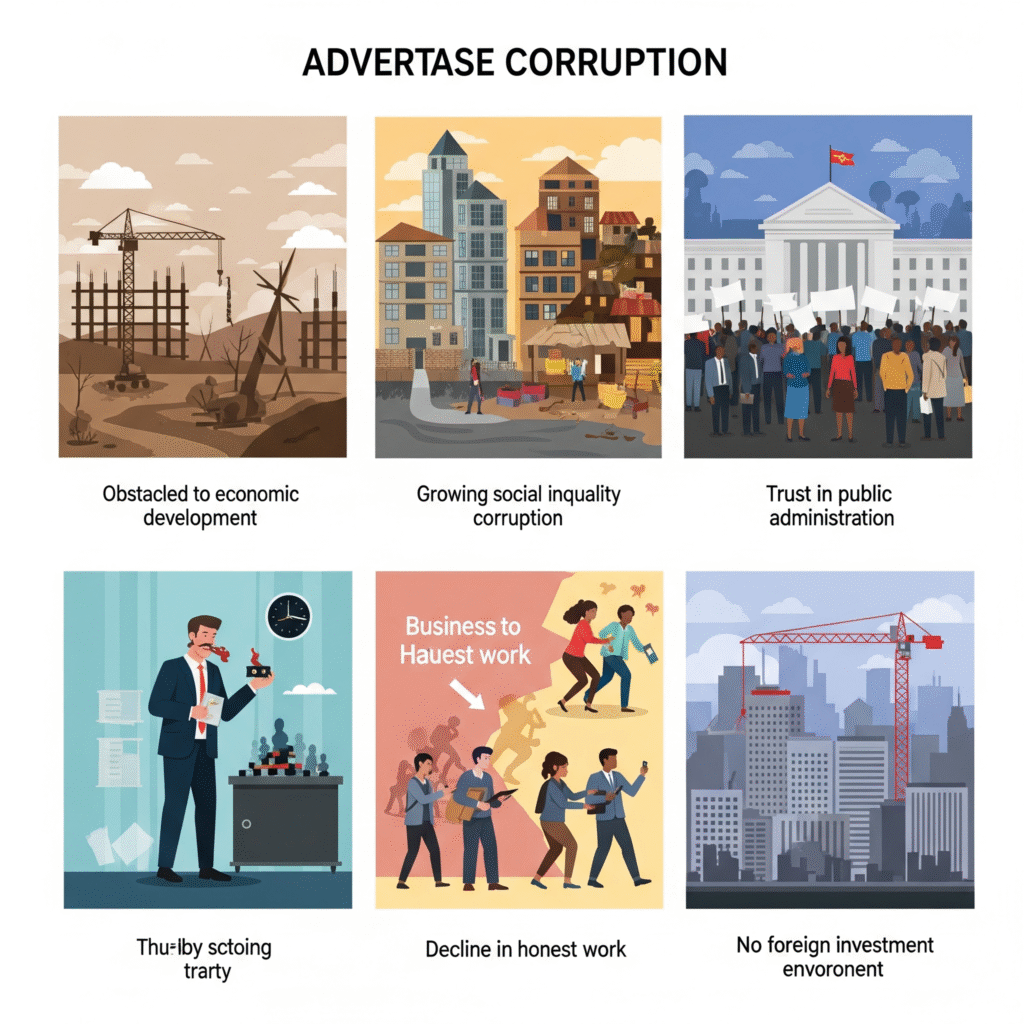
Corruption not only causes economic loss , but it also deeply harms the structure of society , the foundation of democracy and human values. Its major ill-effects are as follows:
- Obstacle in economic development : Corruption
misuses government schemes , projects and resources , which slows down the economic progress of the country. Foreign investors also avoid investing in such an environment. - Increase in social inequality :
Corruption benefits only a few people , while the poor and the general class remain neglected. This increases inequality and dissatisfaction in the society. - Distrust in democratic institutions :
When leaders , officers or judiciary are found involved in corruption , the common people lose faith in democracy and the justice system. - Moral and social degradation :
When people see that there is benefit in dishonest ways , they also start adopting the wrong path. This leads to degradation of morality in the entire society. - Failure of public welfare schemes : Schemes like
education , health , food grains , rural development do not reach the ground level due to corruption , due to which the beneficiaries are deprived. - Administrative inefficiency :
When decisions are taken on the basis of money or personal interests , proper policies are not made and governance becomes weak. - Suppression of innovation and talent : When positions
, jobs or opportunities are given through bribery or recommendation , qualified individuals are left behind and respect for merit is lost. - Internal instability and increase in crime :
Dissatisfaction caused by corruption , unemployment and injustice give rise to instability and criminal tendencies in the society.
In short , corruption hollows out the roots of any nation and without its eradication a prosperous and just society cannot be imagined.
Measures to Prevent Corruption
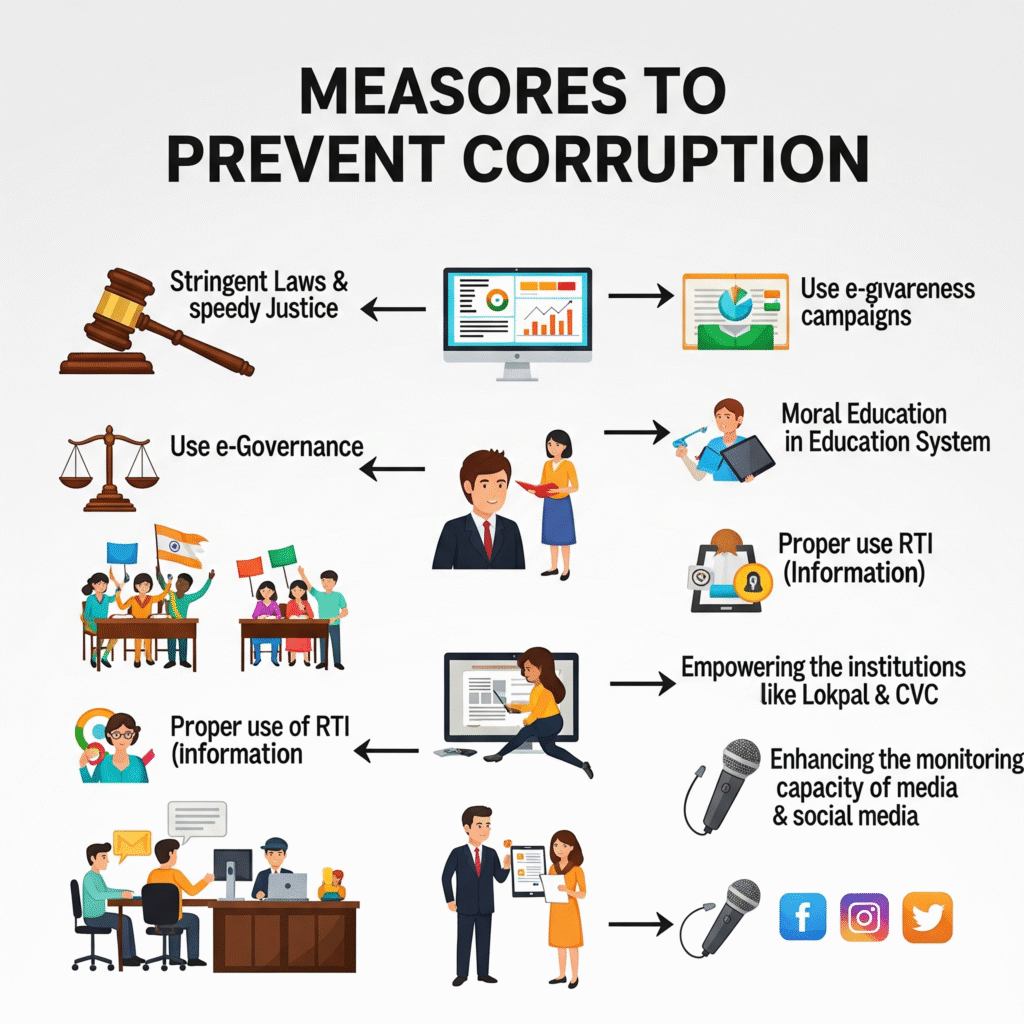
Eradicating corruption is not an easy task , but if the government , society and every citizen make a joint effort , it can be stopped to a great extent. Some effective measures are given below:
- Stringent and effective laws :
Clear and transparent laws with harsh penalties should be made against corruption. The culprits should get quick justice so that fear and discipline is maintained in the society. - Expansion of e-governance :
Transparency and accountability can be increased by bringing government services and processes on digital platforms. This will reduce person-to-person contact and reduce the possibility of bribery. - Right to Information ( RTI) to be used appropriately :
Through the RTI Act, ordinary citizens can demand accountability from the government and administration , thereby increasing transparency and public participation. - Empowering Lokpal and oversight bodies :
Institutions like Lokpal , CVC ( Central Vigilance Commission) must be given independence , resources and legal powers to function effectively. - Promotion of Education and Moral Values : Moral education should
be made compulsory in schools and colleges so that the young generation understands and adopts honesty , service spirit and social responsibility. - Public awareness campaign :
Media , NGOs and social organizations should work together to make the public aware about their rights and the ill effects of corruption. - Administrative reforms :
File processing should be simplified , transfer-posting should be transparent and accountability should be fixed in the decision making process. - Incentive and Reward System :
Honest officers and employees should be encouraged and recognized for their contribution to the society. - Monitoring role of media and social media :
Independent and impartial media can play an important role in exposing corruption . Also , active monitoring and reporting on social media increases the pressure on corruption.
Fighting corruption is possible not only through laws but also through moral awareness and collective efforts. When every citizen takes a pledge that he will neither be corrupt himself nor encourage anyone to be corrupt , only then will true change begin.
Conclusion
Corruption is a serious obstacle for any society and nation , which not only hinders economic development but also weakens social justice , moral values and democratic system. This problem persists only as long as people tolerate it considering it normal. Government efforts alone are not enough to fight corruption , participation of every citizen is essential for this.
We have to make honesty , transparency and accountability a part of our life and work culture. Only through education , awareness and effective enforcement of law can we have a society where honesty is respected and corruption is punished. Only when every person takes the initiative to improve at his own level , will India move towards becoming a strong , prosperous and corruption-free nation.